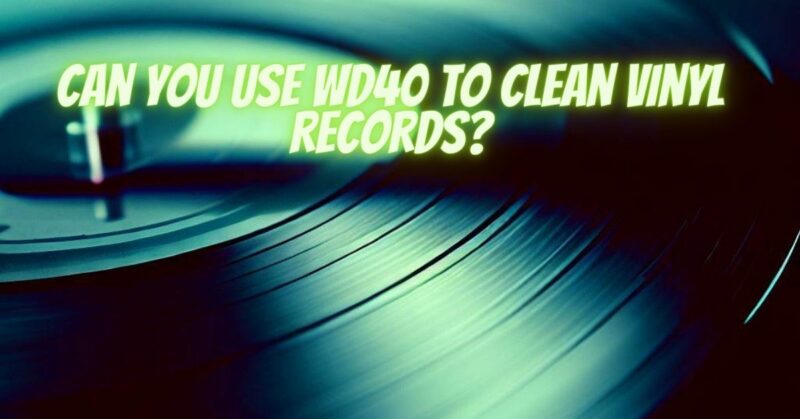Vinyl records are treasured by audiophiles and music enthusiasts for their rich analog sound. Proper care and maintenance are crucial to preserve the quality of your vinyl collection. However, cleaning records can sometimes be a challenge, and some people have wondered whether using WD-40, a versatile household lubricant, can help clean vinyl records. In this article, we will explore whether WD-40 is a safe and effective option for cleaning vinyl records.
Understanding Vinyl Records
Vinyl records consist of grooves that hold the audio information. These grooves are extremely delicate, and any substance that comes into contact with them can have a significant impact on sound quality. Cleaning vinyl records requires gentle methods and suitable cleaning agents to avoid damage.
Why WD-40 is Not Recommended:
- Chemical Composition: WD-40 is primarily composed of mineral oil and various additives. While it is excellent for lubricating and loosening stuck parts, it is not designed for use on vinyl records.
- Residue Buildup: WD-40 can leave behind a residue when applied to surfaces. This residue can be difficult to remove and may adhere to the record’s grooves. Over time, this residue can attract dust and debris, potentially further damaging the record.
- Risk of Damage: Vinyl records are sensitive to any foreign substances, and applying WD-40 can potentially damage the grooves, affecting playback quality. The risk of damaging the record outweighs any potential cleaning benefits.
Safe Cleaning Methods for Vinyl Records:
To clean vinyl records effectively without causing damage, consider the following safe methods:
- Dry Brushing: Start by gently brushing the record’s surface with a carbon fiber or anti-static brush. This helps remove loose dust and debris.
- Wet Cleaning: For more thorough cleaning, use a record cleaning solution specifically designed for vinyl records. Apply the solution with a soft brush or microfiber cloth, working in a circular motion from the center of the record outward.
- Rinsing: Rinse the record with distilled water to remove any cleaning solution residue. Always allow the record to air dry completely before playing it.
- Record Cleaning Machines: If you have a substantial vinyl collection, consider investing in a record cleaning machine, which automates the cleaning process and ensures thorough and safe cleaning.
Preventive Measures:
To keep your vinyl records in excellent condition, consider these preventive measures:
- Handle Records Carefully: Always handle records by their edges to avoid touching the grooves with your fingers.
- Use Inner Sleeves: Store records in anti-static inner sleeves to protect them from dust and debris.
- Store Upright: Store records vertically to prevent warping and damage to the grooves.
- Regular Maintenance: Clean records regularly to prevent dust buildup and maintain sound quality.
In conclusion, while WD-40 is a versatile household lubricant, it is not a suitable cleaning agent for vinyl records. The delicate nature of vinyl records requires specialized cleaning methods and solutions to ensure their preservation and sound quality. By following safe cleaning practices and preventive measures, you can enjoy your vinyl collection for years to come, without the risk of damaging your cherished records.


